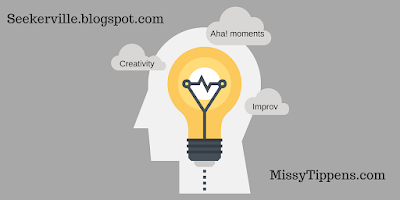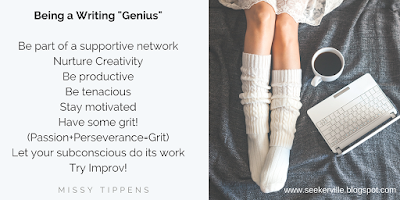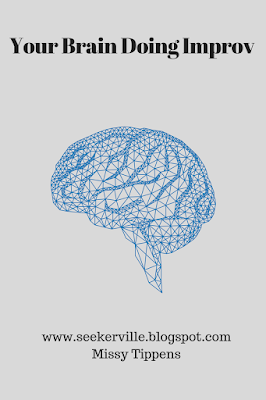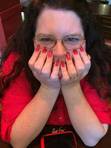Creativity and...Improv?
Missy Tippens
I'm re-sharing a post today from our Archives. (If you're not familiar with our blog, our archives are still available with 10 years of posts at www.seekervillearchives.blogspot.com.) This was a really fun post to research, and I've been thinking a lot about brain science lately so thought I would post it again...
Creativity and...Improv?

I’m fascinated by the brain and creativity. I read the most amazing article recently in the May 2017 issue of National Geographic Magazine. It was titled “What Makes a Genius?” by Claudia Kalb with photography by Paolo Woods. (Links to all articles will be included at the end). This article blew me away.
What sucked me in was how researchers have looked at slides of Albert Einstein’s brain tissue trying to figure out if it’s different from other brains. This led me to some really interesting ideas about creativity and writing.
A few things from Kalb’s article that stood out to me about genius:
--Geniuses are nurtured.--Lone geniuses are rare (they’re usually seen in a network).--Even with natural gifts and a nurturing environment, genius still requires motivation and tenacity (so personality plays a role).--Angela Duckworth believes that a combination of passion and perseverance—what she calls “grit”—drives people to achieve. --Dean Keith Simonton says, “The number one predictor of impact is productivity.” (He uses the example of Thomas Edison having 2000+ patents.)--Scott Barry Kaufman says, “Great ideas don’t tend to come when you’re narrowly focusing on them.” He talks about information coming in consciously but being processed unconsciously so that we sometimes get unexpected “aha” moments. (Yes! I love those!)--Rex Jung says research shows that thought processes like daydreaming and imagining take place in the middle part of our prefrontal cortex across both hemispheres.--Andrew Newberg’s research shows that the genius brain has an area that is twice the size of control brains (the corpus callosum, a centrally located bundle of more than 200 million nerve fibers that joins the two hemispheres of the brain and facilitates connectivity between them).

So, you and I may not be geniuses, but we can learn to nurture creativity, we can stimulate our brains, and we can hang around other people who are creative—those who challenge us, support us and inspire us. We can learn to increase productivity and to persevere.
The “What Makes a Genius?” article also sent me searching for more from Charles Limb. I watched a TED Talk called “Your Brain on Improv.” It’s based on Creativity and the Brain by Dr. Charles Limb and his collaborator Allen R. Braun.
Basically, they used a functional MRI (fMRI) to look at the brain activity of a jazz musician and a freestyle rapper in action (they developed a keyboard that they could put inside the machine). The experiment asked: What happens in the brain when doing something that is memorized and over-learned vs what happens in the brain when doing something that is spontaneously generated or improvised?
They found in the brain during improvisation:--Lateral prefrontal deactivation (a decrease in self-monitoring)--Medial prefrontal activation (an increase in self-expression)
With the jazz pianist, they also found that during improv, his language areas lit up, an area associated with expressive communication.
With the freestyle rapper, major visual areas lit up—even with his eyes closed. He also had major cerebellar activity (associated with motor activities). So, he had heightened activity in multiple areas of the brain.
In another article about Limb's research found in Peabody Magazine by Nick Zagorski and Keith Weller titled “The Science of Improv," they pointed out that during improvisation, the brain regions involved with all the senses lit up, showing a heightened state of awareness. The researchers said the people being tested “literally taste, smell, and feel the air around them.” They described a strange similarity to brain wave patterns that can be seen during REM sleep. So maybe there’s a connection between improv and dreaming.

What does this mean for us as writers?
The first thing that struck me (a plotter/planner), is that I’d like to try doing more “improv.” I’m sure I’ll still want to do my pre-planning. But I’d like to jump in on the first draft and write so that my brain’s self-monitoring turns off and self-expression turns on.
I’d like to try writing with my eyes closed (I do this sometimes already).
I’d like to let go of some of my writing methods that have become learned and practiced and let my brain go wild while creating.
I’d like to continue interacting with all of you who participate in the blog to inspire me and support me. To push me when I need it. You’re my genius network! :)
What about you? Who wants to try doing a little improv the next time you’re working on a new story? Have you had success trying this method already? I'd love to hear what you think!
Here are the links I promised. Enjoy the articles and video, but please come back to chat with us!What Makes a Genius? (National Geographic)Your Brain on Improv (TED Talk)The Science of Improv (Peabody Magazine)--please note this article is no longer available in 2019.
 Missy Tippens, a pastor’s wife and mom of three from near Atlanta, Georgia, has always been a bit of a science geek. Before staying home with her kids, she worked as a clinical microbiologist. Then the writing bug bit. After over ten years of pursuing her dream, she finally made her first sale to Harlequin Love Inspired in 2007. Her books have since been nominated for the Booksellers Best, Holt Medallion, ACFW Carol Award, Gayle Wilson Award of Excellence, Maggie Award, Beacon Contest, RT Reviewer’s Choice Award and Romance Writers of America RITA®. Visit Missy at www.missytippens.com, https://twitter.com/MissyTippens and http://www.facebook.com/missy.tippens.readers.
Missy Tippens, a pastor’s wife and mom of three from near Atlanta, Georgia, has always been a bit of a science geek. Before staying home with her kids, she worked as a clinical microbiologist. Then the writing bug bit. After over ten years of pursuing her dream, she finally made her first sale to Harlequin Love Inspired in 2007. Her books have since been nominated for the Booksellers Best, Holt Medallion, ACFW Carol Award, Gayle Wilson Award of Excellence, Maggie Award, Beacon Contest, RT Reviewer’s Choice Award and Romance Writers of America RITA®. Visit Missy at www.missytippens.com, https://twitter.com/MissyTippens and http://www.facebook.com/missy.tippens.readers.
I'm re-sharing a post today from our Archives. (If you're not familiar with our blog, our archives are still available with 10 years of posts at www.seekervillearchives.blogspot.com.) This was a really fun post to research, and I've been thinking a lot about brain science lately so thought I would post it again...
Creativity and...Improv?

I’m fascinated by the brain and creativity. I read the most amazing article recently in the May 2017 issue of National Geographic Magazine. It was titled “What Makes a Genius?” by Claudia Kalb with photography by Paolo Woods. (Links to all articles will be included at the end). This article blew me away.
What sucked me in was how researchers have looked at slides of Albert Einstein’s brain tissue trying to figure out if it’s different from other brains. This led me to some really interesting ideas about creativity and writing.
A few things from Kalb’s article that stood out to me about genius:
--Geniuses are nurtured.--Lone geniuses are rare (they’re usually seen in a network).--Even with natural gifts and a nurturing environment, genius still requires motivation and tenacity (so personality plays a role).--Angela Duckworth believes that a combination of passion and perseverance—what she calls “grit”—drives people to achieve. --Dean Keith Simonton says, “The number one predictor of impact is productivity.” (He uses the example of Thomas Edison having 2000+ patents.)--Scott Barry Kaufman says, “Great ideas don’t tend to come when you’re narrowly focusing on them.” He talks about information coming in consciously but being processed unconsciously so that we sometimes get unexpected “aha” moments. (Yes! I love those!)--Rex Jung says research shows that thought processes like daydreaming and imagining take place in the middle part of our prefrontal cortex across both hemispheres.--Andrew Newberg’s research shows that the genius brain has an area that is twice the size of control brains (the corpus callosum, a centrally located bundle of more than 200 million nerve fibers that joins the two hemispheres of the brain and facilitates connectivity between them).

So, you and I may not be geniuses, but we can learn to nurture creativity, we can stimulate our brains, and we can hang around other people who are creative—those who challenge us, support us and inspire us. We can learn to increase productivity and to persevere.
The “What Makes a Genius?” article also sent me searching for more from Charles Limb. I watched a TED Talk called “Your Brain on Improv.” It’s based on Creativity and the Brain by Dr. Charles Limb and his collaborator Allen R. Braun.
Basically, they used a functional MRI (fMRI) to look at the brain activity of a jazz musician and a freestyle rapper in action (they developed a keyboard that they could put inside the machine). The experiment asked: What happens in the brain when doing something that is memorized and over-learned vs what happens in the brain when doing something that is spontaneously generated or improvised?
They found in the brain during improvisation:--Lateral prefrontal deactivation (a decrease in self-monitoring)--Medial prefrontal activation (an increase in self-expression)
With the jazz pianist, they also found that during improv, his language areas lit up, an area associated with expressive communication.
With the freestyle rapper, major visual areas lit up—even with his eyes closed. He also had major cerebellar activity (associated with motor activities). So, he had heightened activity in multiple areas of the brain.
In another article about Limb's research found in Peabody Magazine by Nick Zagorski and Keith Weller titled “The Science of Improv," they pointed out that during improvisation, the brain regions involved with all the senses lit up, showing a heightened state of awareness. The researchers said the people being tested “literally taste, smell, and feel the air around them.” They described a strange similarity to brain wave patterns that can be seen during REM sleep. So maybe there’s a connection between improv and dreaming.

What does this mean for us as writers?
The first thing that struck me (a plotter/planner), is that I’d like to try doing more “improv.” I’m sure I’ll still want to do my pre-planning. But I’d like to jump in on the first draft and write so that my brain’s self-monitoring turns off and self-expression turns on.
I’d like to try writing with my eyes closed (I do this sometimes already).
I’d like to let go of some of my writing methods that have become learned and practiced and let my brain go wild while creating.
I’d like to continue interacting with all of you who participate in the blog to inspire me and support me. To push me when I need it. You’re my genius network! :)
What about you? Who wants to try doing a little improv the next time you’re working on a new story? Have you had success trying this method already? I'd love to hear what you think!
Here are the links I promised. Enjoy the articles and video, but please come back to chat with us!What Makes a Genius? (National Geographic)Your Brain on Improv (TED Talk)The Science of Improv (Peabody Magazine)--please note this article is no longer available in 2019.
 Missy Tippens, a pastor’s wife and mom of three from near Atlanta, Georgia, has always been a bit of a science geek. Before staying home with her kids, she worked as a clinical microbiologist. Then the writing bug bit. After over ten years of pursuing her dream, she finally made her first sale to Harlequin Love Inspired in 2007. Her books have since been nominated for the Booksellers Best, Holt Medallion, ACFW Carol Award, Gayle Wilson Award of Excellence, Maggie Award, Beacon Contest, RT Reviewer’s Choice Award and Romance Writers of America RITA®. Visit Missy at www.missytippens.com, https://twitter.com/MissyTippens and http://www.facebook.com/missy.tippens.readers.
Missy Tippens, a pastor’s wife and mom of three from near Atlanta, Georgia, has always been a bit of a science geek. Before staying home with her kids, she worked as a clinical microbiologist. Then the writing bug bit. After over ten years of pursuing her dream, she finally made her first sale to Harlequin Love Inspired in 2007. Her books have since been nominated for the Booksellers Best, Holt Medallion, ACFW Carol Award, Gayle Wilson Award of Excellence, Maggie Award, Beacon Contest, RT Reviewer’s Choice Award and Romance Writers of America RITA®. Visit Missy at www.missytippens.com, https://twitter.com/MissyTippens and http://www.facebook.com/missy.tippens.readers.
Published on March 10, 2019 21:01
No comments have been added yet.



